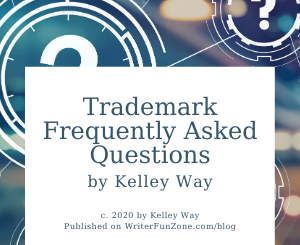Trademarks: Can I Talk About a Real Business in My Book? by Kelley Way
 Let’s welcome back monthly columnist Kelley Way as she shares with us “Trademarks: Can I Talk About a Real Business in My Book?” Enjoy!
Let’s welcome back monthly columnist Kelley Way as she shares with us “Trademarks: Can I Talk About a Real Business in My Book?” Enjoy!
***
Use of Trademarks in Writing
An editor friend of mine told me she recently had a client who made up a restaurant name for her book. When my friend looked into it, she discovered that there was a restaurant with that exact name a few hours from where she lived. She advised her client to change the name, but then asked me: was that the right thing to suggest, or had she been overly cautious?
As a lawyer, I’m not sure that overly cautious is a real thing, but let’s take a look at the relevant law anyway.
When you’re looking to use a business name in your writing, the most common issue is trademark law.
Most business names would qualify as a trademark, since they serve as a source identifier for what the company is selling.
Registering a trademark gives it extra protection, but even an unregistered trademark has some level of protection. It’s best to assume that any business or product name you are using is a valid trademark.
What About Fair Uses of a Trademark?
There are some uses of a trademark that courts have found to presumptively be fair use (in other words, the user gets a free pass).
These uses include referencing the trademark to talk about the product or business (for example, talking about your Disneyland® trip in a memoir); comparing products (for example, Pepsi® commercials often compare their sodas to Coca-Cola®); and critiquing the product or business (for example, user reviews).
Most trademarks in a book will likely fall under that first exception.
Risks
Even so, there are some risks to keep in mind.
One risk is that you use the trademark improperly, which may not necessarily lead to a lawsuit, but certainly will have the trademark owner unhappy with you.
For example, Kleenex® and Xerox® are trying very hard to keep their trademarks from becoming generic (“generic” = users associate the mark with the product generally and not with the company, so it no longer serves as a source identifier).
If your character hands someone a Kleenex (rather than a Kleenex-brand paper tissue) or makes a Xerox (rather than a photocopy on a Xerox machine), company representatives may come knocking on your door.
The other big risk is if the trademark owner doesn’t like what you have to say about their product or business.
There’s not much they can do about an honest user review, but a story that makes them look bad may lead to a lawsuit, even if there’s some evidence to back up the negative report.
It doesn’t take much to start a lawsuit (besides cash), and many people fold at the threat of going to court.
This leads some trademark owners to take the gamble and start a lawsuit they aren’t likely to win, knowing that many times the alleged infringer will settle rather than incur the legal fees that come with litigation.
So what’s a writer to do?
First, think carefully about how important it is to use the trademark in your book. If using the mark doesn’t add value to your book, you may be better off leaving it out.
Second, if you feel it is important to use the trademark, make sure that you are using the mark properly and aren’t saying anything that the trademark owner would object to. Characters meeting at a Starbuck’s® café is probably fine; getting food poisoning from the coffee would likely get you into trouble.
Last but certainly not least, if you feel that it is important to say something negative about a business or product in your book, make sure that
- a) you have evidence to back it up and/or
- b) the criticism is so widely held that your comment is not worth their time to pursue.
If you would like to find out whether your use of a product or business name is safe, or how you can lower your risk of a lawsuit, you are welcome to email me at kaway@kawaylaw.com.
***
ABOUT THE AUTHOR
Kelley Way was born and raised in Walnut Creek, California. She graduated from UC Davis with a B.A. in English, followed by a Juris Doctorate. Kelley is a member of the California Bar, and an aspiring writer of young adult fantasy novels. More information at kawaylaw.com.







